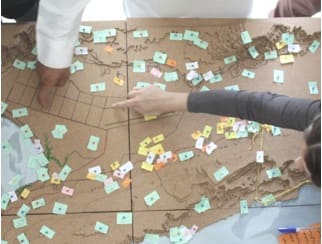
Facilitating a grassroots discussion
Local facilitation team: The local facilitation team (the ‘Team’) is a group of community members who are knowledgeable and enthusiastic about the territory of lifeand willing to facilitate and document the self-strengthening process. Ideally, they arecapable and respected volunteers who reflect and are familiar with the community’s diversity, including people from different age groups, genders, professions, social status and cultural background, as applicable.
The Team is self-selected and has no special authority over the territory of life or the self-strengthening process. As it serves the community, it needs to be approved by the community. We recommend that the Team include at least three people, and ideally five to seven.
External facilitation? Some communities ask the local facilitation team to guide and facilitate the entire process. Others invite external facilitators. If this guidance is used by an external facilitator, we recommend that a local facilitation team is asked to join-in, support, and lead wherever possible.
Grassroots discussions: Grassroots discussions are the key ‘method’ in self-strengthening processes, providing occasions for reflection and analysis within the community.
Grassroots discussions take place in ways consistent with everyday life. They have no set format, as each community meets in ways that are familiar and appropriate to its context. For example, they might be held during a traditional general assembly, at an elders’ council, or at meetings of women’s groups, farmers’ unionor youth associations.
If the group having the discussion does not reflect the community’s full diversity (e.g. in terms of age, genders, ethnicity, social status, etc.) the results of its discussion will later be integrated by further meetings.
Grassroots discussions can be initiated spontaneously, stimulated by a new problem or opportunity,or encouraged by the Facilitation Team. Ideally, they find a good balance between free-flowing and productive and well-focused conversations.
Grassroots discussions are rarely expected to producea yes/no decision. Rather, they explore a subject in-depth and – facilitated by questions – investigate the pros and cons of diverse actions and contribute to shaping new decisions.
Process: Following the appropriate local or customary practises, the Facilitation Team calls for an initial meeting for the community to learn about self-strengthening and decide whether to embark on a process for it. If the community decides that, yes, it wishes to strengthen itself as custodian of a territory of life, the Team calls for a number of grassroots discussions, facilitates those and keeps track of their results.
Each grassroots discussion focuses on a different element of the process and the Team facilitates it by posing a set of relevant questions as a starting point and a frame of reference.
This on-line guidance and the more extensive Guide (available as pdf) are there to support the Team and offer ideas for questions and tools to support the meetings. The questions keep the discussion focused and prevent overpowering by people with the strongest voices, interests and opinions.
The Team notes the results, including the main conclusions and rationale of different participants, as well as whether there were strong dissenting opinions. If appropriate, the Team may also take pictures or videos. The participants in the discussions are often reminded that the entire community is in charge of the process and can choose freely what to do with the information that the Team gathers and compiles. The community is also firmly in charge of analysing, interpreting and using the results of the discussions and the documentation about the territory of life that will be developed along the way.
Timing: There is no set timeframe for a self-strengthening process. It may take days, weeks, months, or even years depending on what the community wishes to do and when they can and wish to dedicate time to it. The facilitation team should plan the process with the community as part of initial steps, with the understanding that plans may evolve.
Considerations for ethical and effective facilitation:
- Respect local culture, protocols and traditions
- Ensure a respectful and open atmosphere
- Be transparent about the potential benefits and risks of engaging in any process
- Be consistent, honest and clear
- Make sure that participants can express themselves in their own language and terms
- Recognize participants’ ideas and capacities
- Be an open and active listener
- Be respectful, sensitive and patient
- Develop a positive rapport with participants, cultivating trust and confidence
- Make sure that participants keep the common overall objectives in mind
- Help focus the discussion on the process element at stake
- Be aware of behaviours and levels of participation
- Play a supportive, accompanying role
- Enable separate meetings for specific people or groups whenever useful or desired
- In case of disagreement remain neutral and calm, help to clarify the issues and bring them down to any existing common values and objectives
- Break conflicting issues into components where at least some agreement can be achieved
- Keep up positive momentum, focusing on shared values and agreements